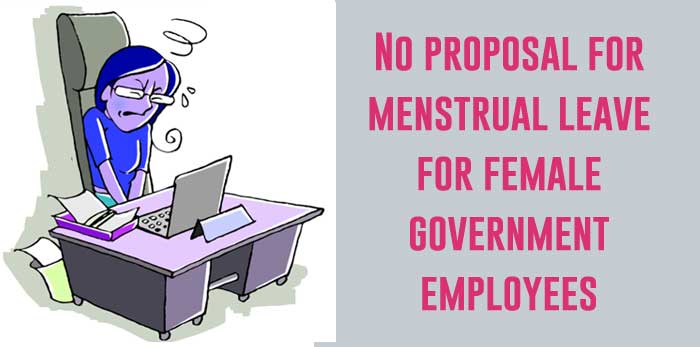Menstrual leave for female government employees
The central government declared on Friday that no proposal to include menstrual leave in governmental departments is being explored at this time. Menstrual leave is a type of leave in which a person may be entitled to paid or unpaid time off from work if they are menstruation and hence unable to work.
Smriti Irani, the Minister of Women and Child Development, told the Lok Sabha that the Central Civil Services CCS (Leave) Rules, 1972, do not include provisions for menstrual leave and that no proposal to introduce such leave is presently under consideration. According to the union minister, female government employees are entitled to earned leave, half-pay leave, unusual leave, child care leave, commuted leave, maternity leave, leave on medical certificate, leave not due, and other sorts of leave under these regulations.
Child care leave rules – CCS Leave Rules, 1972 Gazette Notification
During their menstrual period, many women suffer a variety of problems. Dysmenorrhea is a disorder in which some women experience discomfort during menstruation. Despite having some worries prior to menstruation, up to 80% of women do not experience issues severe enough to interfere with daily functioning as a result of menstruation. Premenstrual syndrome affects 20 to 30 percent of women, interfering with their daily lives. In 3 to 8% of persons, the symptoms are severe. Premenstrual dysphoric disorder (PMDD) is a severe and debilitating type of premenstrual syndrome that affects 1.8–5.8% of women who menstruate.
Meanwhile, in India, a number of private businesses and start-ups, including food delivery apps like Zomato and Swiggy, have introduced a policy allowing employees to take menstruation leave. Last year, Zomato introduced a ten-day paid “period leave” policy for female and trans employees, while Swiggy provides female delivery crew a monthly two-day time off policy during periods. Byju’s, the country’s biggest education app, allows female workers to take up to 12 Period Leaves (PELs) every year, according to the company’s blog.
Menstrual leave is governed or provided for in several nations across the world. Women in Indonesia have the entitlement to two days of menstruation leave every month under the Labor Act No. 13 of 2003, albeit these are not extra leaves. Since 1947, Japan has followed the regulation that “where a woman has sought leave because working during her menstrual period would be very difficult, the employer should not employ such lady on days of her menstrual period.” Female employees in South Korea are entitled to menstruation leave and are guaranteed additional compensation if they do not use the time off that they are entitled to. Women in Taiwan are entitled to three days of “menstrual leave” each year under the Gender Equality in Employment Act.
– Lok Sabha question on Menstrual leave for female government employees


Leave a Reply